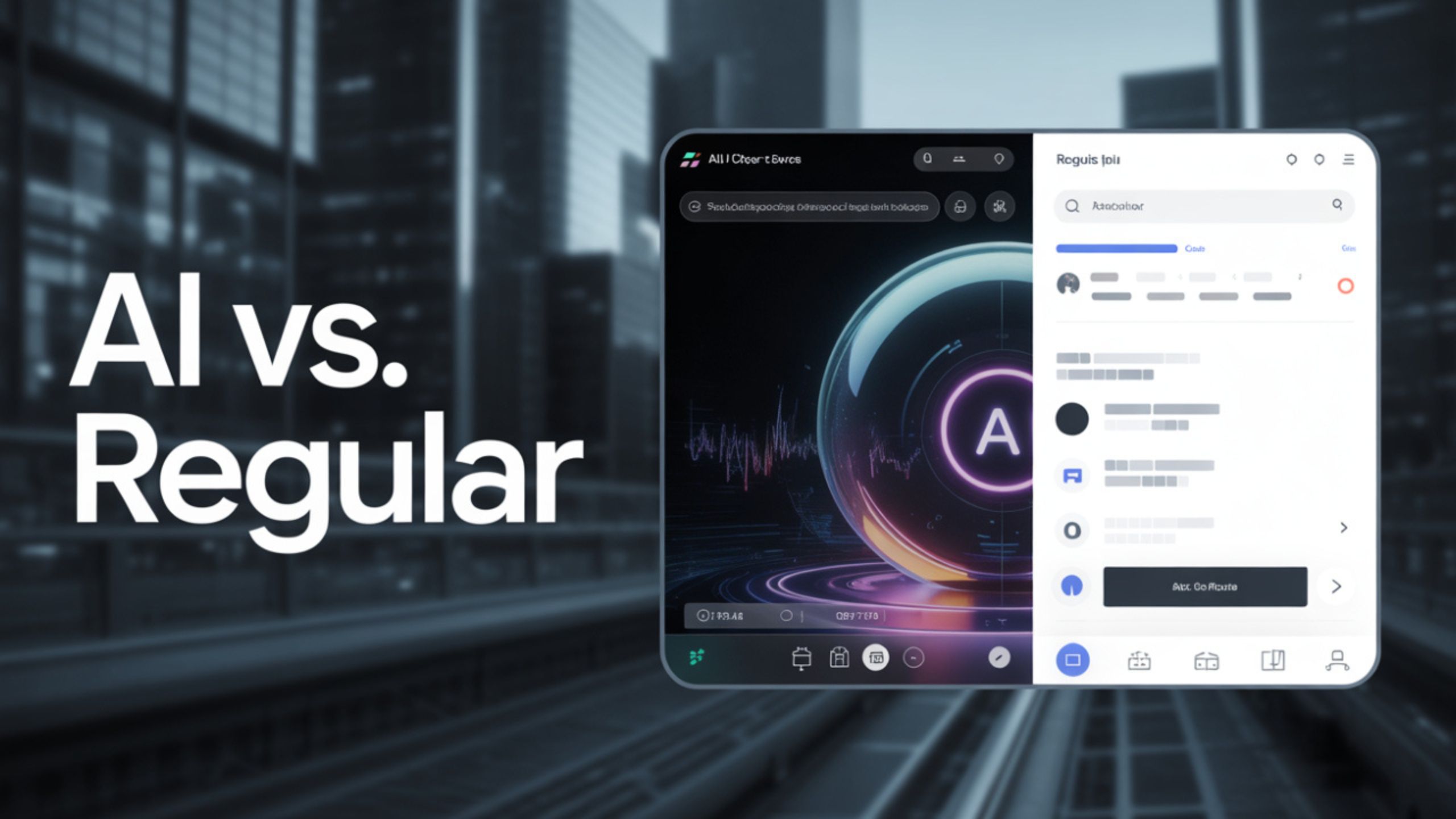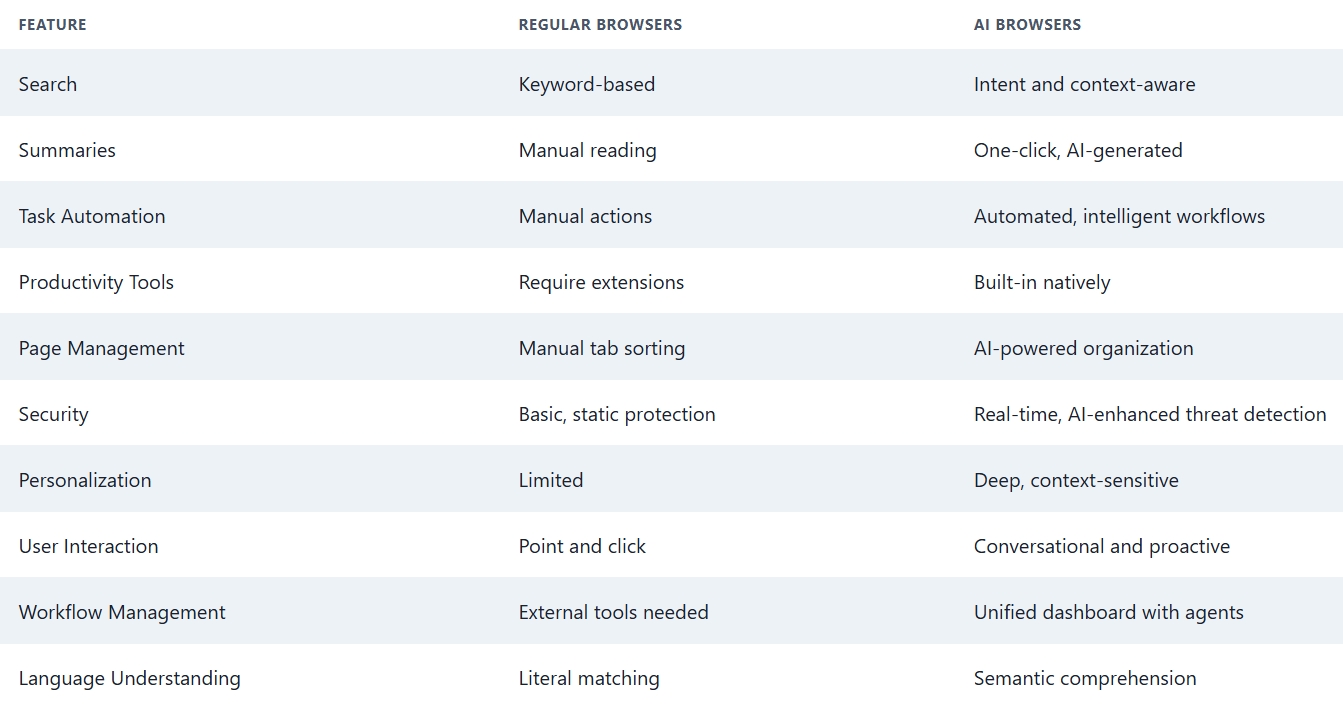The landscape of web browsing is transforming rapidly with the emergence of AI-powered browsers. Unlike traditional browsers that merely load content, AI browsers understand, analyze, and interact with the web. In this detailed comparison, we explore how AI browsers redefine the browsing experience, leaving behind the outdated functionality of regular browsers.
What Are AI Browsers and Why Are They a Game-Changer?
AI browsers are built with machine learning, natural language processing, and automation capabilities that go beyond the scope of traditional browsers. They act as intelligent assistants, capable of understanding user intent, automating tasks, and delivering real-time insights—features that regular browsers lack entirely.
Understand User Intent, Not Just Keywords
Traditional browsers rely on exact-match keywords. When a user types in a query, search engines match those terms with indexed content, with no understanding of context.
On the other hand, AI browsers use large language models (LLMs) like GPT, Claude, or Gemini to comprehend the meaning behind the query. This means:
- Context-aware answers
- Follow-up conversation support
- Smarter suggestions based on user history and patterns
Instead of simply showing search results, AI browsers respond to questions directly, summarize results, or even suggest actions based on the query.
Real-Time Summarization and Intelligent Data Extraction
A groundbreaking capability of AI browsers is the ability to summarize long-form content in real time. This includes:
- Articles
- Research papers
- Product reviews
- YouTube videos
- News reports
Users no longer need to skim through thousands of words. With a single click, the browser can provide:
- Bullet-point takeaways
- Concise summaries
- Key comparisons
- Sentiment analysis of reviews
This revolutionizes the way users research, read, and make decisions online.
Integrated Productivity Tools Built-In
Unlike regular browsers, where users need to install separate extensions for every utility, AI browsers offer native tools:
- Writing Assistants for emails, blog posts, and documentation
- Coding copilots that generate or review code
- Voice-to-text and text-to-voice converters
- Multilingual translation engines
- Smart notetaking and annotation features
- Tab managers powered by AI to auto-organize and collapse groups
These features make AI browsers a complete digital workspace—not just a window to the internet.
⚙️ Automate Repetitive Tasks and Complex Workflows
Regular browsers require users to click, fill out forms, or switch tabs manually. In contrast, AI browsers include agent-like features that can:
- Click buttons
- Navigate multi-step processes
- Book flights or appointments
- Extract and export data into structured formats
- Autofill repetitive forms intelligently
- Execute multi-step workflows autonomously
This transforms the browsing experience from passive searching to active problem-solving and task execution.
Semantic Search with AI Page Summaries
Instead of relying solely on keyword-matching search engines, AI browsers offer:
- Natural language queries
- AI-generated summaries of each search result
- Contextual follow-ups based on user queries
- Relevance scoring and sentiment detection
Users can now ask questions like, “Which phone under $800 is best for photography?” and receive tailored, summarized insights—rather than just a list of links.
Deeply Personalized Browsing Experience
AI browsers adapt to the individual user’s browsing behavior, offering:
- Predictive tab suggestions
- Personalized news feeds
- Intelligent tab hibernation based on usage patterns
- Priority display of frequently accessed websites
- Smart reminders for pending tasks or visited pages
These experiences are curated in real time, far beyond the generic recommendations offered by traditional browsers.
️ Enhanced Security and Privacy with AI Intelligence
AI browsers are built with security as a core feature, not an afterthought. They use real-time threat detection algorithms to:
- Identify phishing attempts
- Block malicious websites and downloads
- Detect browser hijacks and spoofed sites
- Encrypt sensitive workflows
- Run AI models locally for data privacy
Unlike regular browsers that depend on static blocklists, AI browsers use dynamic learning models to detect emerging threats.
All-in-One Integration, No Extensions Required
One of the most frustrating aspects of traditional browsers is extension bloat. You often need multiple add-ons for grammar correction, translation, ad-blocking, productivity, notetaking, and more.
AI browsers remove this clutter by offering everything in one platform, such as:
- Smart assistants
- Multi-modal input (text, voice, image)
- Task management boards
- Content generation tools
- Live collaboration environments
This makes the browser not just a tool, but a central hub for digital life and work.
AI Browsers vs. Regular Browsers: Feature Comparison Table

Notable Examples of AI Browsers
Microsoft Edge with Copilot
- GPT-powered assistant for writing, summarizing, and organizing
- Enhanced security and tab management
- Chat integration directly in the browser sidebar
Perplexity Browser and ChatGPT Browser
- Conversational browsing experience
- Live web search + AI insights
- Seamless blend of search, chat, and exploration
Arc Max by The Browser Company
- Automates workflows via AI commands
- Tab memory, link previews, and sidebar chats
- Visual and minimalistic user interface
SigmaOS and Opera One/Neon
- Visual tab flow powered by AI
- Integrated AI assistants and workspaces
- Built-in research summarizers and task helpers
Wrap Up: The Future of Browsing Is AI-Native
AI browsers don’t just change how we browse—they change why and what we browse. Automation, real-time summarization, predictive personalization, and built-in productivity tools transform a traditionally static experience into a fluid, interactive, and intelligent workspace.
Traditional browsers are being rapidly outpaced. If you’re still using one, you’re simply working harder, not smarter.

Selva Ganesh is a Computer Science Engineer, Android Developer, and Tech Enthusiast. As the Chief Editor of this blog, he brings over 10 years of experience in Android development and professional blogging. He has completed multiple courses under the Google News Initiative, enhancing his expertise in digital journalism and content accuracy. Selva also manages Android Infotech, a globally recognized platform known for its practical, solution-focused articles that help users resolve Android-related issues.





Leave a Reply